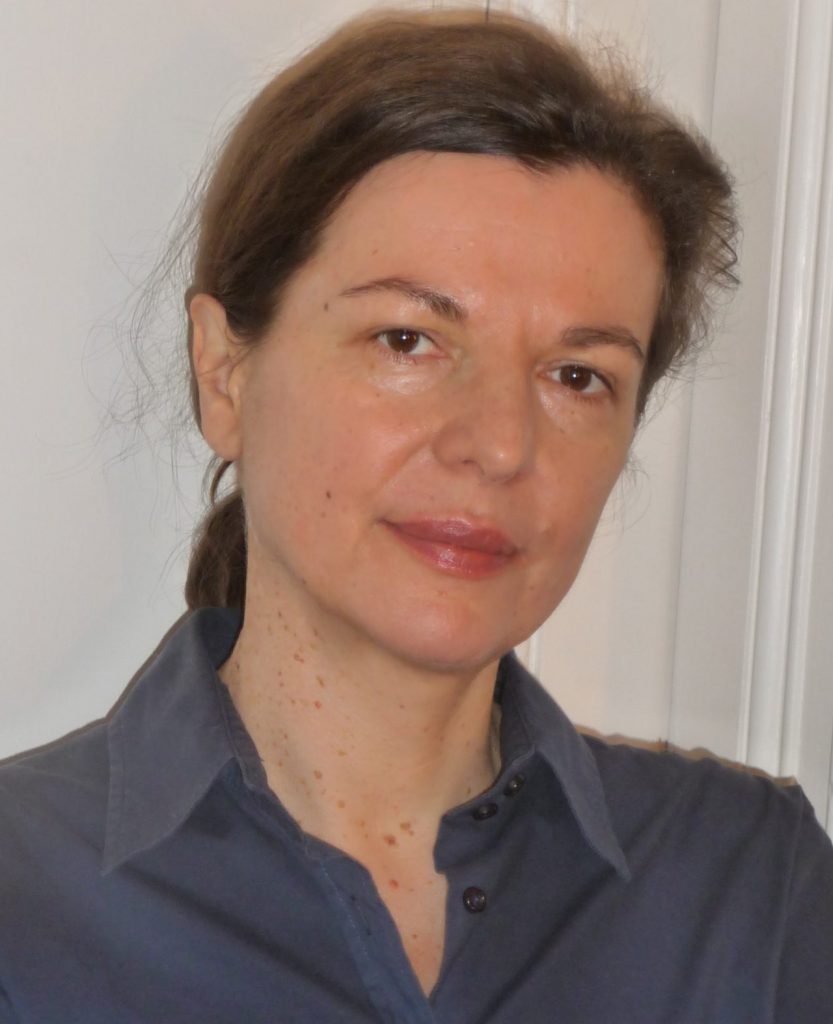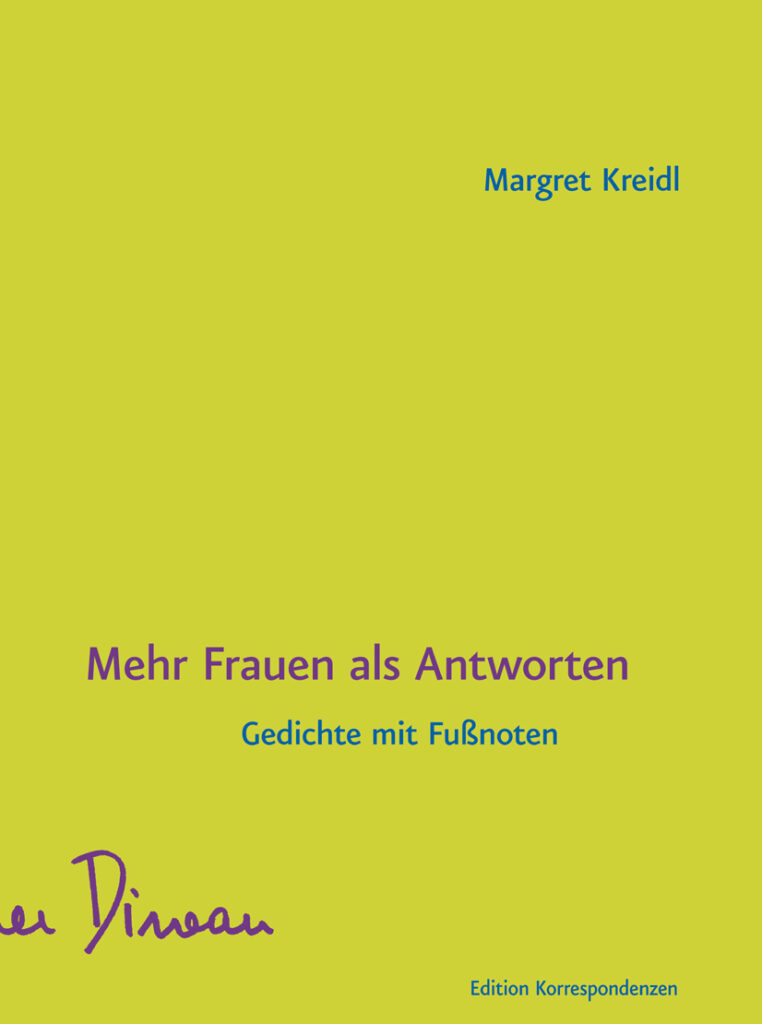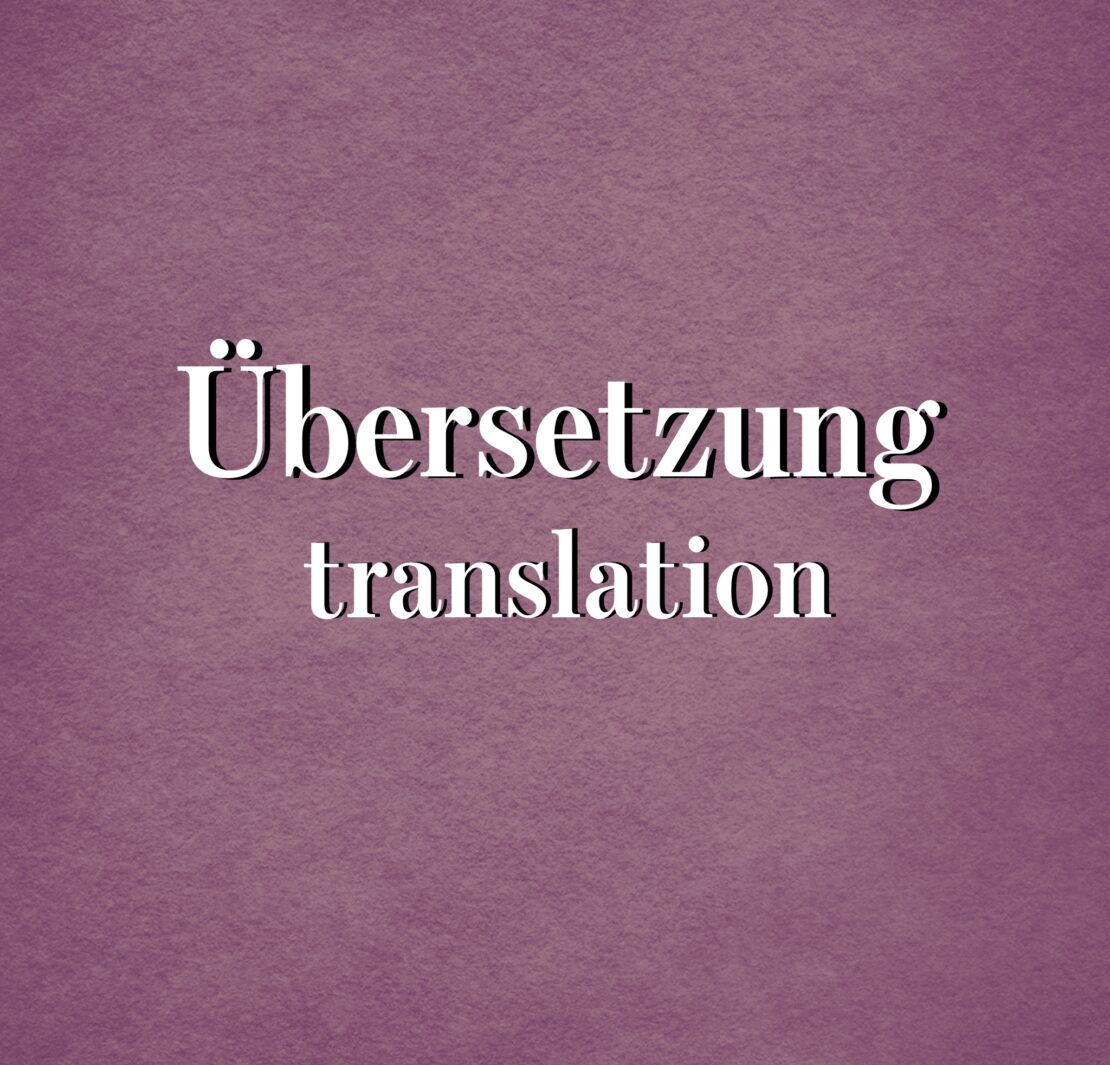Margret Kreidl

Translation: Geoffrey C. Howes
Ein gelber Satz Der Mann steht im Ginster, eine Flasche in der Hand. Das ist Gin, sagt er, Wiener Gin, mit Holundernote, zum Niederknien. Hut ab, sage ich. Er lacht und lässt die Flasche fallen. Siehst du: Es rinnt. Ich bin nicht blind. Er reißt die Arme hoch: Wir schwimmen im Ginster. Im Juli baden kann jeder, sage ich. Willst du tanzen? fragt er. Ich kann nicht tanzen. Er nimmt mich an der Hand. Zähl mit. Eins: Schritt, und schließen, zwei: Schritt. Ein Wischer nach rechts, ein Wischer nach links, langsam, weich. Und aus der Hüfte schwingen, vor und zurück, federn und fließen. Ich komme nicht mit. Mach die Augen zu, sagt er. Was siehst du? Ich sehe Ginster. Ja, das ist ein gelber Satz. Nein, sage ich, es ist finster und ich muss zwanzig Zeilen mit einem Tänzer teilen. A Yellow Sentence The man stands amidst the gorse, a bottle in his hand. That’s gin, he says, Vienna gin, with notes of elderflower, to die for. My hat’s off to you, I say. He laughs and drops the bottle. You see: it’s trickling. I’m not blind. His arms shoot upward: We’re swimming in gorse. Anybody, I say, can swim in July. Do you want to dance? he asks. I can’t dance. He takes me by the hand. Count with me. One: step and close, two: step. A whisk to the right, a whisk to the left, slow and supple. And swing your hips, back and forth, flexing and flowing. I can’t keep up. Close your eyes, he says. What do you see? I see gorse. Yes, that is a yellow sentence. No, I say, it is dark and I must share twenty lines with a dancer.
Krempelsatz Die Stimme von Leonard Cohen an einem Sommernachmittag hinter geschlossenen Jalousien: Take this waltz, ein Foto von Lacramioara Pop, die Barmädchen im Café des Anges in Paris war, ein schroffes Gebet von René Char, die Beschreibung einer Aschekiste, die eine etruskische Urne ist, der lange Stengel roter Zwillingslilien aus einem Sappho-Fragment von Hilda Doolittle, Andere gelbe Tulpen von Luis Cernuda, der einen Nachruf auf Lorca geschrieben hat: Das Salz unserer Welt warst du, ein Rezept für Flammende Eier mit Chorizo: Jede andere Paprikasalami ist ein guter Ersatz, ein Schuss Gin, Holler, Hollunder, Hölderlin – in einem Krempelsatz hat Vieles Platz. Das ist Mist, poetischer Plunder, sagt der Germanist, jetzt räumen wir auf. Nein, sage ich, der Satz geht weiter und er wird in seinem Verlauf zum Tanzboden für zwei Dichterinnen. Junk Sentence Leonard Cohen’s voice on a summer afternoon behind closed blinds: Take this waltz, a photo of Lacramioara Pop, who was a barmaid in the Café des Anges in Paris, a brusque prayer by René Char, describing a cinerary container, which is an Etruscan urn, the long stems of red gemini lilies from a Sappho fragment by Hilda Doolittle, Other Yellow Tulips by Luis Cernuda, who wrote an elegy for Lorca: You were the salt of our world, a recipe for Flemish eggs with chorizo: any other paprika salami is a good substitute, a shot of gin, elderberry, elder, Hölderlin – there’s room for lots of things in a junk sentence. That’s crap, poetical trinkets, the Germanist says, we’re going to clean this place up. No, I say, the sentence continues and in its course it will become a dancefloor for two women poets.
Sätze fürs Leben Ich, Kreidl Margarete rauchte täglich 60 Zigaretten, jetzt rauche ich nicht mehr und schreibe Gedichte über das Meer, Seesterne und Zementdrüsen, Imkerbunker und grüne Wiesen, Weiße Ritter und Schuldenkrisen und über meinen Vater, der Hilfsarbeiter war und zu mir sagte: Wir gehören nicht zu den Gewinnern. Ja, ich bin ich bin ich bin das Kind eines Hilfsarbeiters und ich bin Dichterin, ich weiß, was Sätze fürs Leben sind. Life Sentences I, Margarete Kreidl once smoked 60 cigarettes a day. I don’t smoke anymore, see, but I write poems about the sea, starfish and cement glands, beekeepers’ bunkers and green meadows, white knights and debt crises and about my father, who was an unskilled worker and who said to me:we do not belong to the winners. Yes, I am I am I am the child of an unskilled worker and I’m a poet, I know what life sentences are.
Mein Schiff fährt nicht, es läuft: ein lebendes Werk. Mein Schiff liegt gut im Wasser. Leichtes Wetter, umlaufende Winde. Das Lateinsegel ist gesetzt und das dunkle Blau wächst über den Horizont hinaus. Kein Leuchtfeuer, kein Fischerlicht. Ich sehe die Körper, die auf dem Grund liegen: das tote Werk. Das Lateinsegel ist eine Erfindung der frühen arabischen Schifffahrt. My ship doesn’t sail, it runs: a living artifact. My ship rides well in the water. Mild weather, circulating winds. The lateen sail is set and the dark blue grows out beyond the horizon. No beacon light, no fishing light. I see the bodies lying on the bottom: the dead artifacts. The lateen sail is an invention of early Arabian navigation.
Ein Tapetenmuster aus verschlungenen Weidenzweigen, am runden Tisch wird über Streuobstwiesen diskutiert: oh Expertise! Du kniest vor dem Gemüse und siehst die Vitamine nicht, aber du weißt, der Schinken von morgen heißt Fisch. Manchmal ist das Falsche richtig, Gratisbier und Ersatzgedichte. Du hast das Wort irdisch noch nicht ausgekostet. Es gibt keinen Ersatz für Gedichte. A wallpaper pattern with convoluted willow branches, at the round table they’re discussing meadow orchards: oh expertise! You kneel before the vegetables, not seeing the vitamins, but you do know tomorrow’s ham is called fish. Sometimes what’s wrong is right, free beer and substitute poetry. You still haven’t savored the word earthly. There is no substitute for poetry.
Meine Mutter stieg ins Grab in einem Schürzenkleid, gestärkt. Die Nabelschnur zog mich nach. Ach, ach, ach, ich war erst acht. Meine Mutter liegt im Grab. Das Gras wächst ganz verkehrt in die Erde. Es zieht mich nach. Ach, ich bin noch immer acht. Margarete Kreidl, 11. Juli 1939 – 21. April 1972. My mother climbed into her grave in an apron dress, a starched one. The umbilical cord pulled me after her. .Oh, oh, oh, I was only eight. My mother lies in her grave The grass is growing upside down into the soil. It’s pulling me after it. Oh, I am still only eight. Margarete Kreidl, July 11, 1939 – April 21, 1972.
Papageienkoffer Für Friederike Mayröcker Zitat – Zikade: ein Zirpen, leichtes Zurückzittern. Ich habe ein Buch gelesen: Und ich schüttelte einen Liebling Mein einziger Augentrost Mein süßes Immergrün Mein leuchtendes Honigblatt Ich werde nicht satt: Magische Blätter Ich lese ein Buch, ein Gedicht und meine Beine sprechen mit: die goyarote Hose Kluftrosen, eine Frauenbluse, oder ist es ein Schultertuch, gefaltet über zwei Zöpfen getragen? Ich habe ein Buch gelesen: Reise durch die Nacht Ich träume von einem goyaroten Faden. Fadendrehung: purpurrote Nacht. Fadendrehung: schwarze Naht, Baumwolle. BLAUER BERICHT / ERDICHTUNGEN Ich träume ein Gedicht: ein blaues, mit blauen Rauten gefülltes Zickzackband. Fadendrehung, Zierschuss: Zitat: rot ist unten Ich mache den Papageienkoffer auf: Lucas Georg Matthias Emil Thomas. Ich habe den 1. Vornamen Goethes vergessen Ich habe ein Buch gelesen und jetzt ist mein Herz gelb. Parrot Suitcase For Friederike Mayröcker Citation—cicada: a chirping, a slight chaste chittering. I have read a book: And I shook a darling My only eyebright My sweet evergreen My luminous honeyleaf I can’t get enough: Magical foliage I’m reading a book, a poem and my legs are talking too:t he Goya-red trousers rose diagrams, a women’s blouse, or is it a shawl, folded and worn over two pigtails? I have read a book: A Journey through the Night I dream of a Goya-red thread. A twist of the thread: crimson-red night. A twist of the thread: black seam, cotton. BLUE REPORT / FABRICATED FICTIONS I dream a poem: a blue one, a rickrack full of blue rhombuses A twist of the thread, decorative weft, citing: red is below I open the parrot suitcase: Lucas George Matthew Emile Thomas I’ve forgotten Goethe’s first name I have read a book and now my heart is yellow.

The translated poems originate from:
Margret Kreidl: Zitat, Zikade. Zu den Sätzen. Edition Korrespondenzen, Wien 2017
Margret Kreidl: Mehr Frauen als Antworten. Gedichte mit Fußnoten, Edition Korrespondenzen, Wien 2023
Cover © Edition Korrespondenzen



